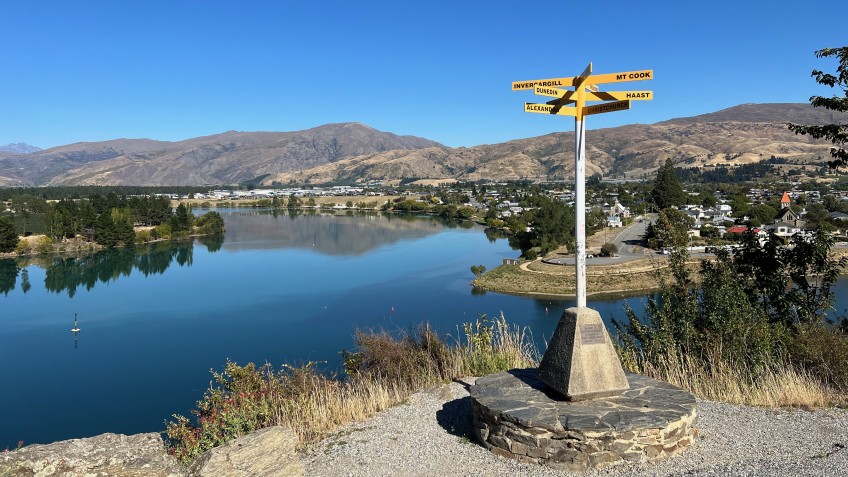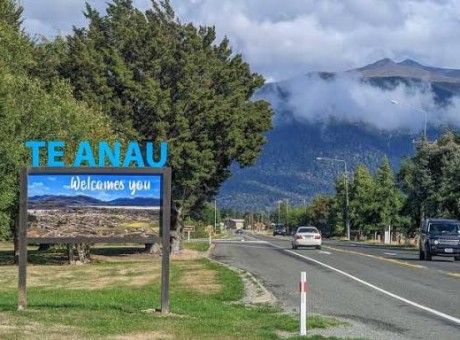CODC consults lawyers over $300m Cromwell endowment land

The Central Otago District Council has gone to the lawyers in an attempt to better understand what it can and can't do with Cromwell's endowment land.
The move comes amidst a controversial debate ignited earlier in the year when the council mooted reducing the decision making power of the district's community boards before agreeing to 'districtise' assets and services formerly managed at a ward level.
Now correspondence revealed by a request for information under the Local Government Official Information and Meetings Act shows senior staff members at the council have sought legal advice on changing the purpose of endowment land and the use of proceeds from any sale of it.
An information vacuum on specific details relating to endowment land in Cromwell - what it is, how it came about, what it is worth, and what impact 'districtisation' and changing community board delegations may have on it - has potentially exacerbated and increased anxiety about policy changes presented by the council.
Crux has seen four responses from southern lawyers Gallaway Cook Allan to questions from three different council staffers - planning and infrastructure group manager Louise van der Voort, business support group manager Saskia Righarts and property manager Garreth Robinson.
Three date back to February, when claims were being made in Cromwell of an 'asset grab' in light of the vote on community board delegations scheduled for that month's council meeting. The fourth lot of correspondence is from May, as the council was regrouping and looking to take a second crack at some of the issues from the angle of 'districtisation' rather than 'delegations'.
On February 16, Gallaway Cook Allan partner Andrew Lovelock responds to Mr Robinson's request for advice "regarding whether or not income from the proceeds of sale of certain endowment land situated at Bannockburn Road, Cromwell can be applied district wide or whether such income is required to be applied to the Cromwell township".
Mr Lovelock's verdict, he says, remains unchanged from when his firm provided similar advice to the council in 2015.
The land passed to the then "mayor, councillors and burgesses of the Borough of Cromwell for an estate in fee simple in trust as endowment in aid of borough funds" under legislation put in place in 1876.
"We note that there is no prohibition on the sale of the property (so it is open to Council to sell the land in accordance with section 140 and section 141 of the Local Government Act 2002).
"The question arises across what area is income from the endowment able to be applied to? In terms of the strict language of the Crown Grant that would arguably be defined by the legal boundaries of the Borough of Cromwell as they existed at the time of the Grant.
"The 2015 advice provided by this firm to Council suggested that it would be reasonable to infer that it was intended to benefit the area that can be regarded as the modern-day town of Cromwell. It may be a useful exercise to ascertain if the legal boundaries of the borough of Cromwell at the time of the Grant (November 1881) can be established but given the town has been relocated and has expanded significantly it would seem reasonable to take the position suggested in the 2015 advice that funds can be applied to the Cromwell township.
"I also note the 2015 advice canvassed the issue of what the funds can be spent on. If you consider you need any additional advice/guidance on that please let me know.
"Of course, as you will be aware, it will be necessary that any proceeds realised from the disposal of the Bannockburn Block are held and accounted for separately by Council. In this regard it is helpful to keep in mind that the land is held on trust for the purposes for which it was endowed."
Mr Robinson then goes back for some clarification.
On February 26, Mr Lovelock replies.
"You have asked whether all of the proceeds of sale of land from the Bannockburn Block can be used or whether only income can be applied (ie. interest earned on the capital amounts realised) and the principal has to remain intact to provide income in perpetuity for the township of Cromwell.
"In our view, on a plain reading of sections 140 and 141 of the Local Government Act 2002 Council may use the 'proceeds of sale' provided the use to which the funds are put is consistent with the purpose of the endowment. In other words, Council may use all the funds realised (subject to our comments in the following paragraph).
"We understand the amount Council anticipates realising from the sale the of the Bannockburn Block is likely to be significant (in the region of $300m in gross terms). To that end, we think the decision to sell the land would be a significant decision and would want to check whether or not Council has indicated/consulted on its intention to sell the land at any point/as part of any consultation process.
"We are aware that the requirement to consult as part of the long term plan process on the use to which proceeds of sale from endowment land is to be put was repealed from the Local Government Act 2002 some years ago. However, given the amount involved we think this pushes the decision into the high significance category and it would be prudent for Council to have made the Cromwell community aware of its intentions/seek their feedback on those plans."
Two days later, Mr Lovelock replies to a question from Ms van der Voort "regarding the ability to apply to the Minister for a change of purpose" of an endowment.
"As far as we can tell the relevant section (s140(4)(a)) has only been used once. It is our firmly held view that it is highly unlikely the purpose could be altered completely (ie. we don’t think you could apply to have the purpose changed to benefit Alexandra for example)," he says.
"As you know, under s140(4)(a) of the LGA, the Minister may approve in writing additional or different purposes for which the endowment property, or income from that endowment property may be used.
"There is little guidance in the case law on the grounds on which the Minister may approve different purposes. There also appear to be very few examples of Councils seeking and receiving a change in purpose.
"We have found one example where Queenstown District Lakes Council requested that the Minister change the purpose of endowment land at Jopp Street, Arrowtown from public utility to housing."
Mr Lovelock goes on to say the process that played out in that case "suggests that seeking a change in purpose may not be easy as the Minister 'rubber stamping' a request from a Council. Rather, the Council should address the question as to why a change of purpose is necessary and undertake consultation if appropriate".
In May, a new legal counsel steps in, Gallaway Cook Allan partner Diccon Sim, replying to Ms Righarts and referencing a recent Google Teams discussion between himself, Mr Robinson and Ms Righarts "around some of the issues related to 'districtisation' and delegations".
"This letter seeks to respond to those matters in your follow up email sent that day."
Mr Sim then lists the issues raised by Ms Righarts, which include questions about who should decide how any money linked to endowment land, or freehold land, is spent under a 'districtised model' - the council or the community board - and how endowment land that has increased in value as a result of district money being should be treated.
"The industrial land in Cromwell is a good example of this," Mr Sim reports Ms Righarts as saying, "Without district money it would not have been re-zoned and increased in value as planning is a district function."
The lawyer is clear in his response to the later question.
"We consider that previous expenditure decisions that have led to the increase in value of endowment land do not change the endowment character of that land or mean that the proceeds of sale, or any of part them, are released from the restrictions on use that the endowment has created.
"However, the fact that the District has invested money in particular activity within an area, and that has resulted in an uplift in the resources available to that area, would be a relevant consideration which future funding (from District resources) was being allocated.
"So, while proceeds from sale of endowment land might not be able to be diverted to elsewhere in the District, overall District funding decisions could legitimately reflect the benefit of 'District' money having been previously applied in the endowment area, and the extra benefits that that funding had brought to that area."
And as to the role any community board may play in divvying up proceeds of any sale of land located within the ward in a 'districtised model'?
"A Community Board within whose area land was located would clearly expect to have a voice in any consultation process - and might wish to make a recommendation as to the use of such proceeds. But we would not consider the District Council to be bound to call for a recommendation or bound to follow any that might be made," Mr Sim says.
The topic has been flagged once again for discussion at the next full meeting of the council, although what motions may be in front of the new mayor and councillors are not yet publicly known.
But community debate and distrust on the topic continues to simmer away.
At yesterday's council meeting, former ACT MP and regional councillor Gerry Eckhoff in the public forum called 'districtisation' a type of "socialism".
And, even with his political credentials, he showed a confusion about Cromwell's endowment land and its history, suggesting communications from the council and its elected members may still be falling short in bringing the community along with it at each step of significant policy shifts and democratic changes.
It may also have allowed an interesting new commentator to emerge on the scene - the mysterious 'Lady Cromwell', who is penning political analysis in the style of fictitious character Lady Whistledown from popular Netflix series 'Bridgerton'.
"It appears that the matter of Community Board delegations will once more find its way onto the Council’s agenda, and with it, a familiar ripple of unease has swept through our beloved townsfolk," she writes on October 21.
"Earlier this year, this very topic sparked no small amount of commotion, only to be carefully shelved with promises of its return for further deliberation. That time, my dears, is fast approaching this December.
"There are whispers—hushed yet persistent—linking districtisation and delegations, with some asserting that these two matters are so intricately intertwined, it is near impossible to separate one from the other. Others, however, argue they are no more connected than chalk and cheese.
"We now eagerly await the Council’s workshops with the community boards, where they are expected to review the delicate question of delegations, especially concerning the sale of land. Will these discussions once again fall upon deaf ears, or, perhaps, might the Council choose to listen to the will of the people?"
Read more:
Controversial 'districtisation' proposal gets CODC go-ahead
CODC restarts old conversation with new tagline - 'One District'
Cromwell 'asset grab' deferred - claims of 'bullying' and 'belittling'
Main image: Which direction will the council take Cromwell in?

























